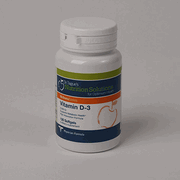By Dr. Rick Tague
Vitamin D
Are you getting enough? Probably not. For up to half the year in Kansas and other states north of Texas, the limited sunshine will not allow us to produce any vitamin D. Vitamin D is known as the “sunshine vitamin” because sunlight starts a chain reaction that produces the vitamin in your skin. 90% of our vitamin D comes from exposure to the sun. The human body can generate 20,000 IU of vitamin D from 30 minutes of summer sun. However, most people in the U.S. get daily intake from food and sun well below ideal, especially in the winter months. The amount of sunshine, time outside, sunscreen use, time of year, and the distance we live from the equator all play a role in the amount of vitamin D our bodies produce. If you are overweight, over age 60, African American, or Hispanic, you are at high risk of deficiency.
New research is revealing just how important vitamin D is to many aspects of health. New studies are showing vitamin D can help preserve muscle strength, slow aging, and aid in the prevention and treatment of several major chronic diseases including cancer, depression, heart disease, multiple sclerosis, diabetes, and high blood pressure.
Let’s review some of the newer findings:
Obesity: Vitamin D increases the body’s ability to absorb calcium by 50%. Research has shown that calcium has a large effect on one’s ability to lose weight and prevent weight gain. Vitamin D is a fat-soluble compound and is stored in body fat. Overweight individuals seem to need twice the vitamin D as those who are normal weight.
Cancer: Researchers attribute vitamin D’s cancer fighting benefits to its ability to prevent the formation of new blood vessels by tumors and to stop high-risk cells from multiplying. Approximately 1500 IU/day reduces cancer death risk by 29%. Another study (Eur J Cancer) showed women with Vitamin D levels less than 50 ng/ml were 6 times more likely to develop breast cancer.
Depression: Several studies have shown that persons who suffer from SAD (seasonal affective disorder, or “winter blues”) who receive optimal vitamin D supplementation experience relief of their symptoms.
Bone and Joint Health: According to a study presented at the American Society for Bone and Mineral Research meeting, over 88% of individuals treated for osteoporosis had low vitamin D. Low levels are associated with increased bone and joint pain, disability, and fracture risk. In fact, achieving adequate levels of vitamin D has been shown to reduce fracture risk by at least 33%. Osteoarthritis is 3 times more likely to progress if vitamin D levels are low.
So what dose should you be taking? The RDA still holds to a recommendation of 400 IU daily although nutritional experts around the world believe this is too low. The recommended intake is at least 1,000 IU per day and can be 5-10 times this amount for some people. To ensure optimal levels, we encourage Vitamin D blood testing to determine where your level is at and to facilitate prescribing the appropriate dose. If testing is not an option, a moderate dose (2,000 IU/day) in addition to that contained in a multi-vitamin and calcium supplement is still recommended.
At The Center For Nutrition, we can have your Vitamin D level checked and make sure that your body is getting the amount needed for optimal health! Just give us a call!
Get some Vitamin D at the Dr. Tague Nutrition Store

